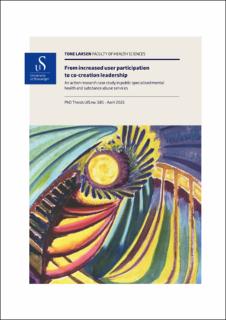| dc.contributor.advisor | Sagvaag, Hildegunn | |
| dc.contributor.advisor | Karlsen, Jan Erik | |
| dc.contributor.author | Larsen, Tone | |
| dc.date.accessioned | 2021-04-14T15:03:12Z | |
| dc.date.available | 2021-04-14T15:03:12Z | |
| dc.date.issued | 2021-04 | |
| dc.identifier.citation | From increased user participation to co-creation leadership: An action research case study in public specialised mental health and substance abuse services by Tone Larsen, Stavanger : University of Stavanger, 2021 (PhD thesis UiS, no. 581) | en_US |
| dc.identifier.isbn | 978-82-7644-997-6 | |
| dc.identifier.issn | 1890-1387 | |
| dc.identifier.uri | https://hdl.handle.net/11250/2737792 | |
| dc.description.abstract | The main aim in this thesis has been to develop a ‘user participation method’ that ensures both service user and service provider impact on service development. An action research single case study was conducted in a Norwegian mental health and substance abuse unit. Increased user participation in public service development and dialogue between stakeholders about service development were facilitated by the researcher through participative observation and in collaboration with stakeholders. Stakeholders engaged as co-researchers and participants in planning meetings and working groups and in co-researcher led multistage focus group interviews, semi-structured individual interviews and dialogue seminars. The overall research question related to the main aim was How can participation and real influence from patients and staff in service development be ensured? Three articles were produced to inform the research question and the main aim.
The contribution to theory in article one is to create awareness about concurrent diagnostic culture that keeps patient voices from being heard. The findings suggest that facilitating self-empowerment among service users and providers through training, supervision and explorative dialogue may enable reciprocal empowerment between these stakeholders. In turn, this may make it possible for them to have a united voice when it comes to developing and transforming services.
Article two reveals how organisational defence mechanisms hinder double-loop learning among staff. It proposes elements necessary to unlock the potential of genuine co-production relationships between service users and providers including a mutual agreement, a fixed coproduction meeting, joint training/roleplay, and spaces for group and individual reflexivity.
In article three, the contribution has been identifying leadership behaviours that enable co-created organisational adaptability in PSOs.
The following definition of co-creation leadership is proposed: the ability to recognise service users, providers, and formal leaders as colleagues who co-create services and value in a reciprocally empowering working alliance. Further, some specific requirements of co-creation leadership are presented: 1) enabling dialogue and adaptive spaces, 2) acknowledging that power is negotiated and relational, 3) coconstructing and connecting leadership to core tasks and functions (not just formal position), 4) recognising consultation, facilitation and delegation as key to decision commitment and collective mobilisation, and 5) ambidextrously maneuvering between participation and decisiveness, care and autonomy, and production and innovation.
To explore how knowledge about a) the relationship between the articles; b) the preliminary main result, namely a co-production method; and c) conceptualisation of co-creation leadership can contribute to existing and future PSO challenges, the following synopsis research question was posed:
The role of leadership. How can systematic involvement of leaders, users and providers enable organizational adaptation in public services?
The three articles and experiences with the research design have informed the main result: a renamed and updated co-creation method. This method is described as both a practice and an action research method that enables a shift in organisational culture and practice towards a co-creation orientation. In this orientation, facilitating participative coproduction of existing services is just as pertinent as facilitating coinnovation of new services. Such facilitation is accomplished through the creation of communicative and adaptive spaces for stakeholders’ exploratory dialogue. Systematic integration of a co-creation practice, which is defined as the way stakeholders actually collaborate to evaluate, improve, plan, initiate and innovate services, is central. Furthermore, an understanding of co-creation leadership has been included in the cocreation method design. Multiple choices of leadership behaviours and role-migration between stakeholders are essential.
The implication for practice and research is that the co-creation method has several paths to choose from and can therefore be adapted to various contexts. The co-creation method may be introduced as both a practice and a research method, and it can be utilised as a tool for service improvement, innovation and service/environmental sustainability within and outside of PSOs. Furthermore, leader presence is encouraged to root and legitimise co-creation. Conceptualisation of co-creation leadership may strengthen the co-creation of services and value potential. | en_US |
| dc.language.iso | eng | en_US |
| dc.publisher | University of Stavanger, Norway | en_US |
| dc.relation.ispartofseries | PhD thesis UiS; | |
| dc.relation.ispartofseries | ;581 | |
| dc.relation.haspart | Paper 1: Larsen, T., & Sagvaag, H. (2018). Empowerment and pathologization: A case study in Norwegian mental health and substance abuse services. Health Expectations, 21(6), 1231-1240. | en_US |
| dc.relation.haspart | Paper 2: Larsen, T, Karlsen, JE og Sagvaag, H: Keys to unlocking service provider engagement in constrained co-production partnerships. Action Research. | en_US |
| dc.relation.haspart | Paper 3: Larsen, T, Karlsen, JE og Sagvaag, H: Co-creation leadership. A process study of leadership for organizational adaptability. Public Performance & Management Review, in review. | en_US |
| dc.subject | helse- og sosialfag | en_US |
| dc.subject | rusmisbruk | en_US |
| dc.subject | brukermedvirkning | en_US |
| dc.subject | psykisk helse | en_US |
| dc.subject | mental helse | en_US |
| dc.title | From increased user participation to co-creation leadership: An action research case study in public specialised mental health and substance abuse services | en_US |
| dc.type | Doctoral thesis | en_US |
| dc.rights.holder | ©2021 Tone Larsen | en_US |
| dc.subject.nsi | VDP::Medisinske Fag: 700::Helsefag: 800 | en_US |
